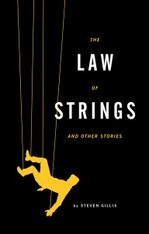Ann Arbor author Steven Gillis talks about his new story collection, 'The Law of Strings'

“My life is pretty crazy,” said Gillis during a recent interview. “ … I get up ridiculously early, about four in morning; I work out, and then I start my writing day; several hours in, I start mixing in Dzanc stuff; when I finish up my writing for the day, I focus on business, and for the rest of the day, Dzanc stuff keeps me on task. It’s just a matter of scheduling. … I don’t know how I do it. I just do it.”
So when I called (after three) with questions about Gillis’ newest collection, I took pains to stay on task.
Q. One of the first things I noticed about the stories in “The Law of Strings” is that several of them feature an external representation of the characters’ anxieties about being in a relationship. In one story, a woman worried about her ability to commit has her boyfriend literally tie her down, and in another, a man attempts the world’s most dangerous stunts but is terrified to declare his love to his partner. Is this a line that runs through a lot of your work, or did it arise while writing these stories specifically?
A. I think it’s clearly something that is a part of me and my writing. I did not set out to create a collection with a universal theme, but as it turned out, it’s definitely there. I’m someone who’s pretty anxious about relationships and emotions.
Q. Your characters often have unusual names (Evanshere, Dudee, Harshe, Whare, etc.). What’s your process for naming them?
A. As a writer, I just feel closer to my characters after I name them, and it’s not usually a normal name. If I name them Fred and Sally—I just wouldn’t feel the same about them. Art decisions are personal decisions, and I feel closer to characters when they have unique names, for better or worse.
Q. Scientific laws and theories haunt many of these stories. Is science a particular side interest of yours?
A. I find science fascinating. I’m inspired by the poetry you find in science, and in writing itself - there’s a mathematical precision in writing. I’m not a scientist, … so as a layman, I research and read about these things, and I read them as poetry. … Life revolves around science. We’re here because of the laws of the universe, and to serve them up as art—there are all these beautiful connections in nature that can create wonderful stories.
Q. I’m always interested in the process of putting together a story collection. How did you establish an order for the stories?
A. I think about it only when that task comes in front of me. The first story (“What We Wonder When Not Sure”) is so different from the other stories, and I didn’t want it to get lost in the collection. … I also have this thing from the music world, where the third song is often the title of album, so I placed “The Law of Strings” third. … I just used my gut and felt my way along. I do the same thing at Dzanc, when I’m working on other people’s collections and putting the pieces together. I just feel my way through it.
Q. Some story titles in the collection (“What We Wonder When Not Sure,” “The Things We Cling To When Holding On,” “What Gives When Things are Asked For”) are reminiscent of Raymond Carver titles. Was that a deliberate homage?
A. I love Carver, but I didn’t do that consciously. But I could see why it seems that way. I hate titles, to tell you the truth. … John Cheever did, too, so he had his wife come up with his stories’ titles - that’s the legend, anyway. So they’re all really straightforward. I hate doing titles. It drives me nuts. … I try to come up with something. I just don’t want it to be bland.
Q. Is an image or a sentence a starting point for your stories, usually?
A. There’s a general idea, a very general idea of something I want to examine, so I’ll start from that and create a situation. Everyone has their own writing style. I’m one of those writers who drafts and drafts and drafts. For 10 page story, I may write 100 pages. I’ll just keep writing see where it goes.
Q. “The Law of Strings” is published by Atticus Books, but you could have published it through your own company, Dzanc. Did you feel like you had to go elsewhere to avoid the appearance of self-publishing?
A. I wish it wasn’t that way. I published 3 or 4 books before founding Dzanc, and they won some awards—but I understand it. Matt Bell, who works for us - he’s a fantastic writer, but I can’t publish him for that same reason. … You go back to the ‘60s, when there was a fiction collaborative out of New York of a dozen or so writers, and they’d publish their own works, but it’s a weird thing. It’s tricky for me. … Fortunately, when I finished the collection, I got offers pretty quickly.
Jenn McKee is the entertainment digital journalist for AnnArbor.com. Reach her at jennmckee@annarbor.com or 734-623-2546, and follow her on Twitter @jennmckee.

